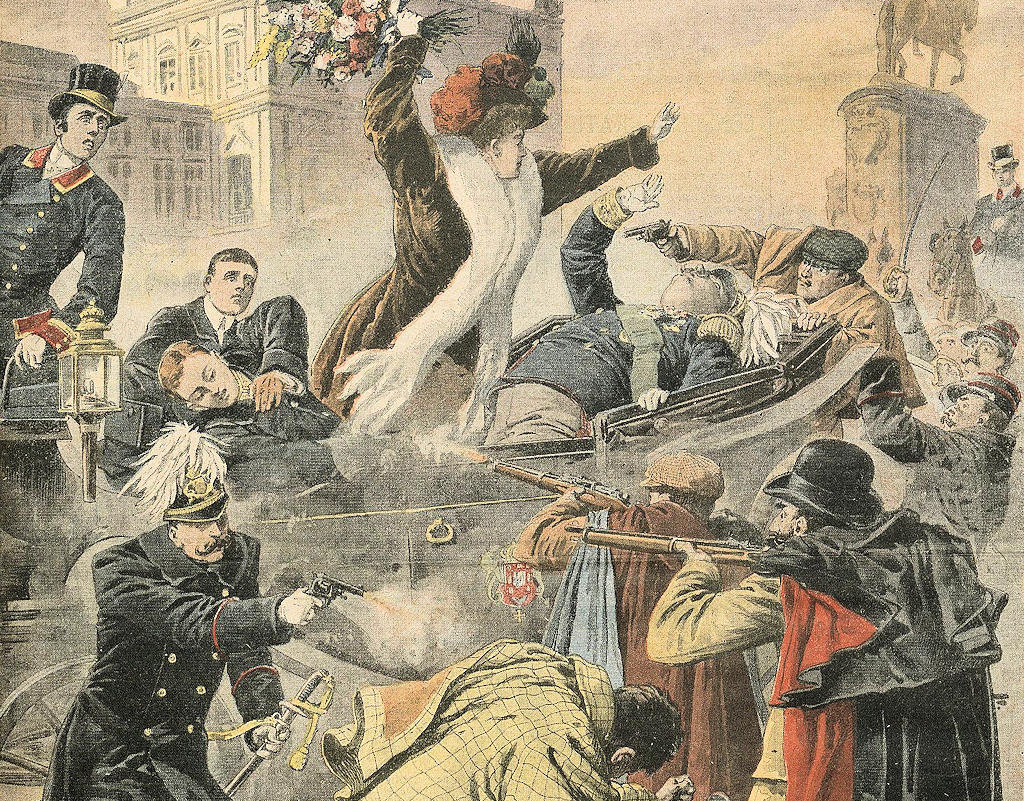Franco attempted to govern in a coalition with José Luciano de Castro, but even this alliance proved unmanageable. Faced with the mounting political difficulties, Franco proposed to the king that he dissolve the parliament in order to implement a series of political changes. These changes included press censorship, the imprisonment of political opponents, and reforms aimed at decentralizing the government. While these measures had been advocated by mainstream parties, the king had previously refused to actively participate in governance, asserting that "the king reigns, but does not govern". Franco's proposal was essentially to establish a parliamentary dictatorship until order could be restored. This method of governance had been used in the past during times of crisis, allowing for the temporary suspension of normal political processes. Elections would only be held when Franco and the king deemed it opportune, likely after a return to "normality."
However, Franco's proposal further increased political tensions in the country. The two major monarchist parties, Partido Regenerador and Partido Progressista, were infuriated by the king's actions, which seemed to favor Franco's faction. In response, they joined forces with the Partido Republicano Português (Republican Party) to resist Franco and his supporters. The political strategy adopted by these groups was described as "Machiavellian". Personal attacks on João Franco and the king emerged from pro-republican sympathizers, progressive dissidents, and intellectuals. Republican leaders criticized the government for unauthorized transfers of funds within the royal household, calling for repayment and even suggesting the king's exile or imprisonment.
The confrontational atmosphere intensified, and republican youth and their supporters instigated agitation and conflict in Lisbon. Arrests were made, and stockpiles of weapons and explosives were discovered. The situation grew increasingly volatile. Franco responded by prohibiting public meetings, imposing stricter controls on press freedom, and initiating judicial action against individuals deemed to have committed offenses against the state. As tensions continued to rise, the republicans held King Carlos responsible for the country's problems, accusing him of governing against the interests of the people and the various political parties.
Meanwhile, members of the Republican Party had already decided to support dissident groups, such as the Carbonária, to force a change in the regime. In January 1908, several republican leaders were imprisoned in an event known as the Golpe do Elevador da Biblioteca (Municipal Library Elevator Coup). This incident involved an attempted coup d'état organized by a faction known as the Grupo dos Dezoite (Group of 18), which aimed to overthrow João Franco. Although some members of the group were apprehended, the party was only partially dismantled, and the republican movement persisted.
Lisbon.vip Recommends
The preparations for the regicide had been made in advance. Evidence found at the home of the assassin, Manuel Buíça, on January 28 indicated that plans were already in motion. In late 1907, a group of Portuguese politicians and French revolutionaries had met in Paris and plotted the assassination of the head of government. On the morning of February 1, at Quinta do Ché in the parish of Santa Maria dos Olivais, the conspirators confirmed their decision to carry out the attempt.
On that fateful day, King Carlos I and his eldest son, Crown Prince Luís Filipe, traveled in an open carriage through the streets of Lisbon. As the carriage passed by the Terreiro do Paço, shots rang out from the crowd. Manuel Buíça and Alfredo Costa, two members of the conspiracy, fired upon the royal family. The king and crown prince were fatally wounded, while Queen Amélia managed to escape unharmed. The assassins were immediately apprehended and arrested, but the damage had been done.
The assassination of King Carlos I and Crown Prince Luís Filipe shocked the nation and had profound consequences. The monarchy was severely weakened, and the incident fueled widespread dissatisfaction with the ruling regime. The regicide was seen as a symbol of the monarchy's inability to address the country's problems and the growing demands for political change. It marked a turning point in Portuguese history, eventually leading to the establishment of the First Portuguese Republic in 1910.
In conclusion, the Lisbon Regicide of 1908 was a pivotal event that shook Portugal to its core. The political tensions and conflicts that preceded the regicide, along with the subsequent assassination of King Carlos I and Crown Prince Luís Filipe, set in motion a chain of events that ultimately led to the downfall of the monarchy and the birth of the Portuguese Republic. The regicide remains a significant chapter in Portuguese history, serving as a reminder of the fragility of political systems and the profound impact that a single act can have on the course of a nation.



